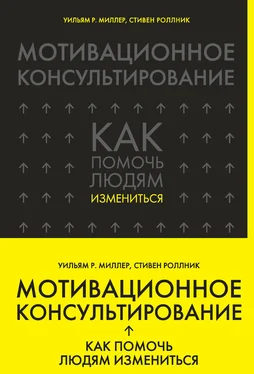problem drinking in the general hospital. British Journal of Addiction, 83, 83–89.
Elwyn, G., Edwards, A., Kinnersley, P., & Grol, R. (2000). Shared decision making and the concept of equipoise: The competences of involving patients in healthcare choices. British Journal of General Practice, 50 (460), 892899.
Enea, V., & Dafinoiu, I. (2009). Motivational/solution-focused intervention for reducing school truancy among adolescents. Journal of Cognitive and Behavioral Psychotherapies, 9(2), 185–198.
Engle, D. E., & Arkowitz, H. (2006). Ambivalence in psychotherapy: Facilitating readiness to change. New York: Guilford Press.
Erickson, S. J., Gerstle, M., & Feldstein, S. W. (2005). Brief interventions and motivational interviewing with children, adolescents, and their parents in pediatric health settings: A review. Archives of Pediatrics and Adolescent Medicine, 159, 1173–1180.
Erol, S., & Erdogan, S. (2008). Application of a stage based motivational interviewing approach to adolescent smoking cessation: The transtheoretical model-based study. Patient Education and Counseling, 72(1), 42–48.
Evans, C. C., Sherer, M., Nakase-Richardson, R., Mani, T., & Irby, J. W., Jr. (2008). Evaluation of an interdisciplinary team intervention to improve therapeutic alliance in post-acute brain injury rehabilitation. Journal of Head Trauma Rehabilitation, 23 (5), 329–338.
Farbring, C. A., & Johnson, W. R. (2008). Motivational interviewing in the correctional system: An attempt to implement motivational interviewing in criminal justice. In H. Arkowitz, H. A. Westra, W. R. Miller, & S. Rollnick (Eds.), Motivational interviewing in the treatment of psychological problems (pp. 304–323). New York: Guilford Press.
Feldstein, S. W., & Ginsburg, J. I. D. (2006). Motivational interviewing with dually diagnosed adolescents in juvenile justice settings. Brief Treatment and Crisis Intervention, 6(3), 218–233.
Feldstein Ewing, S. W., Filbey, F. M., Sabbineni, A., Chandler, L. D., & Hutchinson, K. E. (2011). How psychological alcohol interventions work: A preliminary look at what fMRI can tell us. Alcoholism: Clinical and Experimental Research, 35 (4), 643–651.
Festinger, L. (1957). A theory of cognitive dissonance. Stanford, CA: Stanford University Press.
Field, C., & Caetano, R. (2010). The role of ethnic matching between patient and provider on the effectiveness of brief alcohol interventions with Hispanics. Alcoholism: Clinical and Experimental Research, 34(2), 262–271.
Fixsen, D. L., Naoom, S. F., Blase, K. A., Friedman, R. M., & Wallace, F. (2005). Implementation research: A synthesis of the literature. Tampa, FL: National Implementation Research Network.
Flattum, C., Friend, S., Neumark-Sztainer, D., & Story, M. (2009). Motivational interviewing as a component of a school-based obesity prevention program for adolescent girls. Journal of the American Dietetic Association, 109(1), 91–94.
Foley, K., Duran, B., Morris, P., Lucero, J., Jiang, Y., Baxter, B., et al. (2005).
Using motivational interviewing to promote HIV testing at an American Indian substance abuse treatment facility. Journal of Psychoactive Drugs, 37(3), 321–329.
Ford, M. E. (1992). Motivating humans: Goals, emotions, and personal agency beliefs. Newbury Park, CA: Sage.
Forsberg, L., Berman, A. H., Kallmen, H., Hermansson, U., & Helgason, A. R. (2008). A test of the validity of the motivational interviewing treatment integrity code. Cognitive Behaviour Therapy, 37(3), 1–9.
Forsberg, L., Kallmen, H., Hermansson, U., Berman, A. H., & Helgason, A. R. (2007). Coding counsellor behaviour in motivational interviewing sessions: Inter-rater reliability for the Swedish motivational interviewing treatment integrity code (MITI). Cognitive Behaviour Therapy, 36(3), 162–169.
Frank, J. D., & Frank, J. B. (1993). Persuasion and healing: A comparative study of psychotherapy (3rd ed.). Baltimore, MD: Johns Hopkins University Press.
Frankl, V. E. (2006). Man’s search for meaning. Boston: Beacon Press.
Fromm, E., (1956). The art of loving. New York: Bantam Books.
Fuertes, J. N., Mislowack, A., Bennett, J., Paul, L., Gilbert, T. C., Fontan, G., et al. (2007). The physician-patient working alliance. Patient Education and Counseling, 66(1), 29–36.
Gance-Cleveland, B. (2007). Motivational interviewing: Improving patient education. Journal of Pediatric Health Care, 21(2), 81–88.
Gaume, J., Bertholet, N., Faouzi, M., Gmel, G., & Daeppen, J.-B. (2010). Counselor motivational interviewing skills and young adult change talk articulation during brief motivational interventions. Journal of Substance Abuse Treatment, 39(3), 272–281.
Gaume, J., Gmel, G., & Daeppen, J.-B. (2008). Brief alcohol interventions: Do counsellors’ and patients’ communication characteristics predict change? Alcohol and Alcoholism, 43, 62–69.
Gaume, J., Gmel, G., Faouzi, M., & Daeppen, J. B. (2009). Counselor skill influences outcomes of brief motivational interventions. Journal of Substance Abuse Treatment, 37(2), 151–159.
Gendlin, E. T. (1961). Initiating psychotherapy with «unmotivated» patients. Psychiatric Quarterly, 35, 134–139.
Gilmore, S. K. (1973). The counselor-in-training. Englewood Cliffs, NJ: Prentice Hall.
Ginott, H. G. (1965). Between parent and child. New York: Macmillan.
Gladwell, M. (2007). Blink: The power of thinking without thinking. New York: Little, Brown & Company.
Glasser, W. (1975). Reality therapy: A new approach to psychiatry. New York: Harper.
Glynn, L. H., Hallgren, K. A., Houck, J. M., McLouth, C. J., Fischer, D. J., & Moyers, T. B. (2011, June). Introducing the “CACTI” sequential-coding software: A free, open-source program for rating client and provider speech. Poster presented at the 34th annual meeting of the Research Society on Alcoholism National Conference, Atlanta, GA.
Glynn, L. H., & Moyers, T. B. (2010). Chasing change talk: The clinician’s role in evoking client language about change. Journal of Substance Abuse Treatment, 39, 65–70.
Goddard, C., & Wierzbicka, A. (1994). Semantic and lexical universals. Amsterdam: John Benjamins Publishing.
Golin, C. E., Earp, J. A., Grodensky, C. A., Patel, S. N., Suchindran, C., Kali– chman, K. P., et al. (2012). Longitudinal effect of Safe Talk, a motivational interviewing-based program to improve safer sex practices among people living with HIV/AIDS. AIDS and Behavior. doi:10.1007/s/10461–011–0029–SC
Gollwitzer, P. M. (1999). Implementation intentions: Simple effects of simple plans. American Psychologist, 54, 493–503.
Gollwitzer, P. M., & Schaal, B. (1998). Metacognition in action: The importance of implementation intentions. Personality and Social Psychology Review, 2, 124–136.
Gordon, T. (1970). Parent effectiveness training. New York: Wyden.
Gordon, T., & Edwards, W. S. (1997). Making the patient your partner: Communication skills for doctors and other caregivers. New York: Auburn House Paperback.
Gordon-Reed, A. (2009). Jefferson’s vision. Newsweek, 153, 61–64.
Graeber, D. A., Moyers, T. B., Griffith, G., Guajardo, E., & Tonigan, S. (2003). A pilot study comparing motivational interviewing and an educational intervention in patients with schizophrenia and alcohol use disorders. Community Mental Health Journal, 39(3), 189–202.
Grant, J. E., Donahue, C. B., Odlaug, B. L., Kim, S. W., Miller, M. J., & Petry, N. M. (2009). Imaginal desensitisation plus motivational interviewing for pathological gambling: Randomised controlled trial. British Journal of Psychiatry, 195(3), 266–267.
Читать дальше
Конец ознакомительного отрывка
Купить книгу












